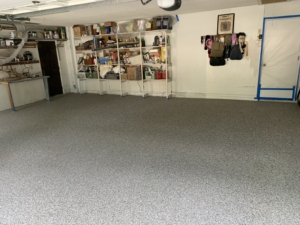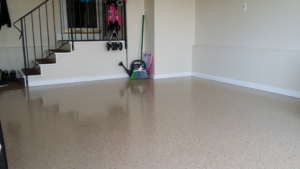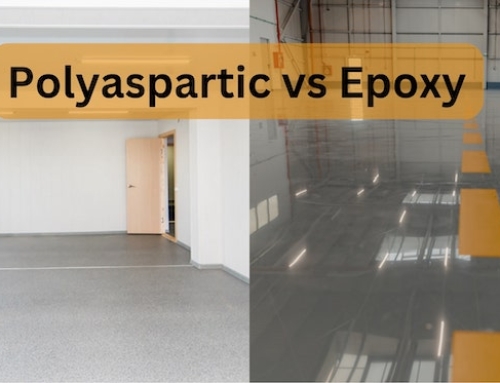Welcome to the world of epoxy flooring, where durability meets aesthetic appeal. If you’re here, you’re likely pondering the lifespan of an epoxy flooring system and how long this popular flooring solution can endure. Epoxy flooring systems have become a cornerstone in industrial and commercial settings, where it is admired for their remarkable resilience and versatility.
In this blog, we’ll delve into the factors that influence the longevity of epoxy floor coatings, helping you understand why they’re a go-to choice for businesses and homeowners alike. We’ll explore the essential elements contributing to their robustness, from foot traffic to chemical resistance.
As a professional epoxy installer, I’ve witnessed the incredible transformation epoxy brings to surfaces, from concrete floors in your garage to commercial properties with heavy traffic. Discover the secrets to making your epoxy coating last, from complete regular maintenance tasks to UV exposure and additional topcoats.
So, if you’ve ever wondered, “How long does epoxy floors last?” – you’re in the right place. Let’s journey through the world of epoxy floor coating and uncover the keys to their exceptional durability.
Factors Affecting Epoxy Floor Coating Durability
As one of the professional installers, I’ve seen firsthand how various factors can influence the durability of an epoxy floor coating. Understanding these factors is crucial for ensuring your epoxy flooring stands the test of time in industrial, commercial, or residential settings.
Environmental Conditions
Epoxy floors are remarkably adaptable, but they do respond to environmental conditions. Temperature and humidity play pivotal roles in epoxy floor longevity. Excessive temperatures can cause the epoxy to expand or contract, potentially leading to cracks. Proper curing is essential in areas with high humidity to prevent issues like bubbling or delamination.
Example: In an epoxy garage flooring, exposure to freezing temperatures during winter without adequate protection can lead to premature wear and damage.
Traffic and Usage
The level of foot and vehicle traffic your epoxy floor experiences is significant. Epoxy floors excel in high-traffic areas, but excessive wear and tear can degrade the surface over time. Understanding the type and frequency of traffic is vital in choosing the right epoxy system.
Example: An industrial facility with heavy machinery requires a more robust epoxy coating than a residential garage.
Installation Quality
The quality of the installation can’t be overstated. A professional installer with expertise ensures proper surface preparation, mixing ratios, and application techniques. Cutting corners during installation can result in adhesion issues and reduced durability.
Example: Improper surface preparation, such as not removing oil stains from a concrete floor before epoxy application, can lead to bonding problems.
Substrate Preparation
The substrate, or the surface to which epoxy is applied, must be meticulously prepared. Any defects or contaminants on the substrate can compromise the epoxy’s adhesion and lifespan. Proper substrate preparation involves cleaning, repairing cracks, and sometimes using epoxy primers.
Example: A concrete floor with cracks left unattended before epoxy application can lead to visible fissures in the finished surface.
Therefore, the durability of epoxy floor coatings is influenced by a multitude of factors. By considering environmental conditions, traffic patterns, installation quality, and substrate preparation, you can maximize the lifespan of your epoxy flooring, ensuring it remains a reliable and attractive flooring solution for years to come.
Expected Lifespan of Epoxy Floor Coatings

As a professional epoxy installer, one of the most common questions I encounter is, “How long do epoxy floors last?” It’s a valid concern, as the expected lifespan of epoxy floor coatings can vary depending on several key factors.
Typical Durability Range
Epoxy flooring is renowned for its durability, often outlasting many other options. On average, you can expect an epoxy floor to last anywhere from 10 to 20 years or even longer with regular cleaning and maintenance. However, it’s important to note that this is a general estimate, and the actual lifespan can differ significantly based on several factors or circumstances.
- Traffic Intensity: The amount and type of traffic an epoxy floor experiences can significantly impact its lifespan. In areas with heavy foot traffic or wheeled vehicles’ constant movement, such as warehouse forklifts, the epoxy may wear down faster. Conversely, the epoxy can last longer without significant wear in areas with lighter traffic, like a residential basement.
- Chemical Exposure: Epoxy flooring’s resistance to chemicals is one of its strengths. However, the specific chemicals it comes into contact with can vary widely. In industrial settings where harsh chemicals are regularly spilled or used, the epoxy may require more frequent maintenance and recoating to maintain its integrity. In contrast, epoxy floors in less chemically aggressive environments may experience minimal degradation.
- Maintenance Practices: Regular and proper maintenance plays a vital role in extending the lifespan of epoxy floors. Floors that are regularly cleaned, free from debris, and undergo scheduled maintenance tasks like recoating when necessary tend to last longer. Neglected floors that accumulate dirt, grime, and damage over time may have a shorter lifespan.
- Proper Installation: The quality of the initial epoxy installation is paramount. If the surface wasn’t adequately prepared, if the epoxy wasn’t mixed correctly, or if there were errors during the application process, the floor’s durability may be compromised. Proper installation ensures a strong bond and longevity.
- Climate and Environmental Conditions: Epoxy floors can be sensitive to temperature and humidity fluctuations. In regions with extreme climate variations, where temperatures can soar or drop dramatically, the epoxy may expand and contract, potentially leading to cracking or delamination. High humidity levels during installation can also affect the curing process.
- Purpose and Use: The intended use of the space can impact the epoxy floor’s lifespan. For example, a manufacturing facility where heavy machinery is constantly in motion may experience more wear and tear than a showroom with static displays.
Variability by Application
The lifespan of epoxy floor coatings can vary depending on where they are installed. In industrial and commercial settings, where epoxy is exposed to heavy foot traffic, wheeled vehicles, and potentially harsh chemicals, the wear and tear might be more pronounced. In contrast, an epoxy garage floor in residential or basements may last longer due to lighter usage. For example, an epoxy coating floor in a busy manufacturing facility may require recoating every 7 to 10 years, while an epoxy garage floor in a home might last 15 years or more.
It’s essential to remember that the expected lifespan of epoxy floor coatings isn’t solely determined by the epoxy itself but also by how well it’s installed and maintained and the specific conditions it faces.
Signs of Epoxy Floor Coating Wear and Aging
As a professional epoxy installer, I understand the importance of recognizing the signs that indicate wear and aging in epoxy floor coatings. Identifying these signs early can help you address issues promptly, ensuring the longevity and safety of your epoxy flooring.
1. Visual Changes

- Dull Appearance: Over time, epoxy floors can lose their shine and develop a dull, matte finish, especially in high-traffic areas.
- Discoloration: Exposure to UV light or certain chemicals may cause epoxy coatings to change color, appearing faded or discolored.
- Cracks and Chips: Small cracks or chips can emerge on the surface, detracting from the floor’s smooth appearance.
2. Performance Issues
- Reduced Slip Resistance: Wear and tear can reduce slip resistance, potentially creating safety hazards, especially in industrial settings.
- Adhesion Problems: As epoxy ages, it may lose its bond to the underlying surface, causing sections to lift or peel.
- Difficult Clean-Up: Epoxy coatings that have aged may become more challenging to clean, as dirt and stains can penetrate the surface.
3. Safety Concerns
- Uneven Surface: Wear and aging can result in an uneven surface, which poses tripping hazards, especially in areas with foot traffic.
- Chemical Resistance: If the epoxy’s chemical resilience diminishes, it may become less effective at protecting against spills and corrosion.
- Impact Resistance: In some cases, aged epoxy may become more susceptible to damage from impacts, such as dropped tools in a garage or warehouse.
Regularly assessing your epoxy coating floor for these signs of wear and aging and taking appropriate action, such as recoating or performing maintenance tasks, can help extend its lifespan and maintain a safe and visually appealing surface.
Maintenance Practices to Extend Durability
Maintaining the longevity and appeal of your epoxy floor is essential, whether in residential, industrial, or commercial industries. As a professional epoxy installer, I recommend the following maintenance practices to help you maximize the durability of your epoxy flooring investment:
1. Regular Cleaning
– Sweep and Dust: Regularly sweep or dust mop your epoxy coating floor to remove dirt, debris, and abrasive particles that can wear down the surface.
– Mild Cleaning Solutions: Clean spills promptly with a gentle, pH-neutral cleaner to prevent stains and maintain the epoxy’s luster.
– Avoid Harsh Chemicals: Avoid using chemicals that may be harsh or abrasive cleaning tools that can damage the epoxy’s finish.
2. Recoating and Refinishing

– Recoat Periodically: Consider recoating your epoxy resin floor every 5 to 10 years, depending on usage. This process refreshes the surface and extends its lifespan.
– Refinish When Necessary: If your epoxy coating floor shows signs of wear or damage, such as dullness, small cracks, or chips, refinishing can restore its appearance and functionality.
– Consult Professionals: Enlist the expertise of professional epoxy installers for recoating and refinishing to ensure a high-quality finish.
3. Protective Measures
– Use Mats and Rugs: Place mats or rugs at entry points to trap dirt and prevent it from being tracked onto the epoxy surface.
– Furniture Pads: Attach felt or rubber pads to the legs of furniture and equipment to prevent scratches and scuffs.
– Traffic Management: Establish clear pathways or designate areas with heavy wear to distribute traffic evenly in high-traffic areas.
– Avoid Extreme Conditions: Minimize exposure to extreme temperature fluctuations, as this can affect the epoxy’s performance.
By incorporating these maintenance practices into your routine, you can significantly extend the life of your epoxy flooring.
Key Takeaway
In conclusion, epoxy flooring stands as an enduring flooring solution for a myriad of settings, from industrial giants to residential spaces. As we’ve explored the factors influencing its lifespan and the importance of proper maintenance, it’s clear that longevity and performance go hand in hand.
At Creative Resurfacing Solutions, we’re committed to helping you reap the long-term benefits of epoxy floors. With professional installation, regular maintenance, and strategic care, your epoxy flooring can exceed expectations, proving to be both durable and visually appealing.
Remember, the key to preserving your epoxy floor’s luster and strength lies in embracing its amazing durability and giving it the proper care it deserves. Reach out for a free estimate and embark on your journey to enduring flooring excellence.

